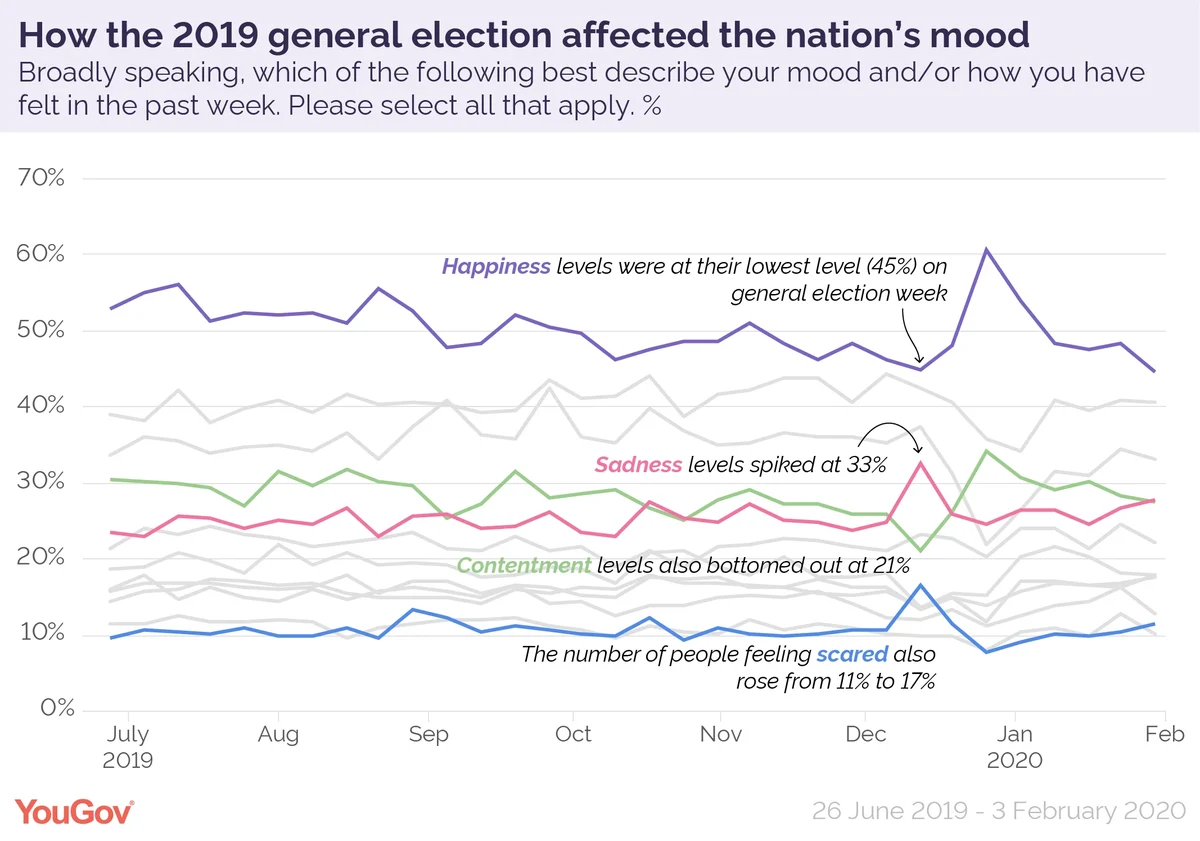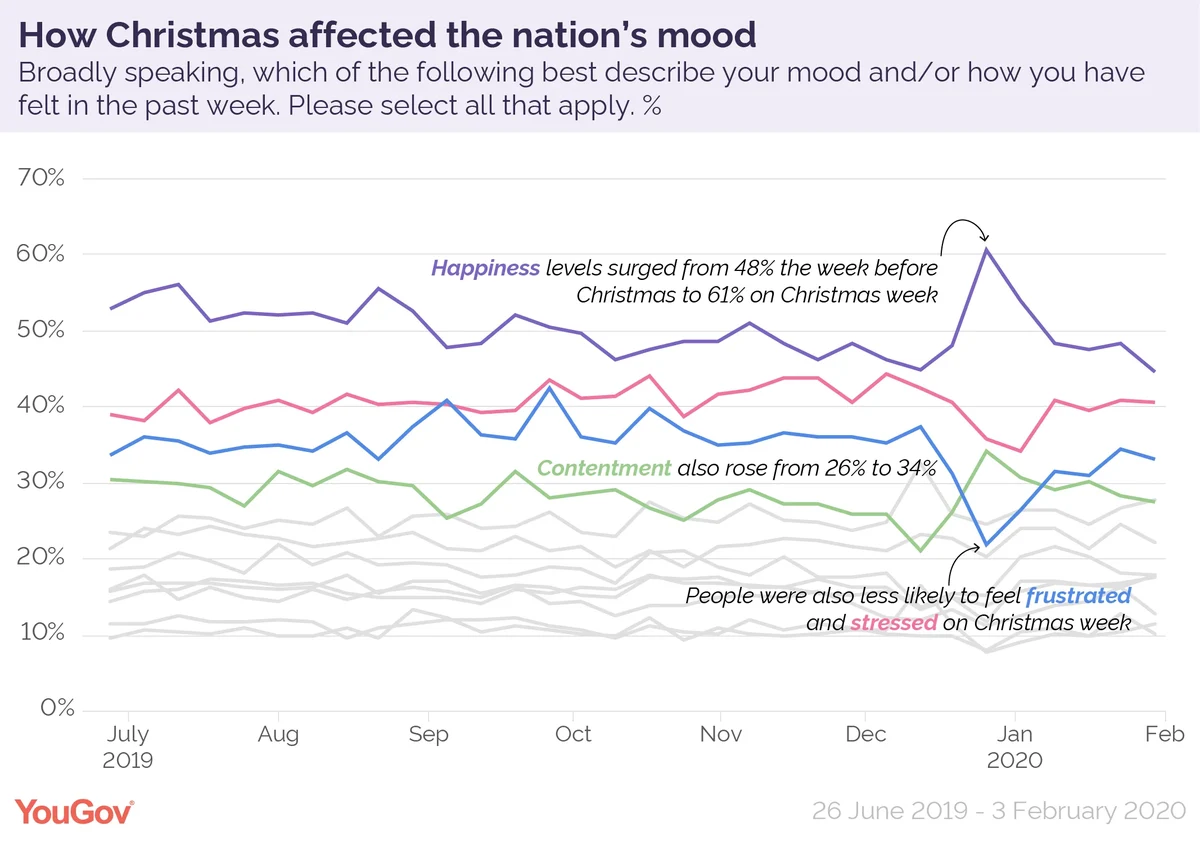Levels of stress, happiness and fear have returned to normal after the COVID-19 pandemic, although boredom and frustration remain elevated
This week marks a year since YouGov first started tracking Britain’s emotional state as part of our public data trackers programme. To celebrate, we’ve taken a look back over the data to see how the nation’s mood has been affected by a general election, Brexit and coronavirus.
2019 general election
The result of December’s general election had a noticeable effect on the national mood. Election week saw the proportion of Brits feeling sad spike to 33%, having been at 25% the week before. Likewise, there was a spike in the number of people feeling scared, up to 17% from 11% the week before. In both cases the figures returned to normal levels the following week.
People identifying with the Labour Party experienced the biggest emotional impact. The proportion feeling sad rose from 24% the week before the election to 38% upon Boris Johnson’s victory, while reports of feelings of fear rose from 10% to 23%.
Unsurprisingly, there was no spike in negative sentiment among those who consider themselves Conservative, although nor did happiness levels increase.
Christmas
The tracker clearly showed the impact that the festive season had on the national mood. In the week before Christmas 48% of Brits said they felt happy; this figure rose to 61% for the week of Christmas itself. At the same time the number of people feeling content rose from 26% to 34%.
Christmas week also saw a reduction in the number of people feeling stressed, to 36% from 41% the week before, while levels of frustration fell from 31% to 22%.
Yuletide cheer lasted for two weeks, with figures across all these emotions having returned to normal levels by January 10th.
Coronavirus
The virus didn’t have any impact on the public mood until mid-March. The initial period between March 6th and 23rd saw the biggest change.
Happiness plummeted from 50% to just 25%, and went from the most commonly expressed emotion to sixth place. At the same time, levels of optimism fell from 24% to 16%, as did contentment from 29% to 13%.
Stress supplanted happiness in first place, seeing an increase from 42% to 50%. The proportion of people feeling scared shot up from 13% to 36%.
The immediate impact of the coronavirus outbreak on the nation’s mood
Levels of frustration saw a minor increase, from 35% to 41%, likewise with sadness from 31% to 37%.
Boredom levels would increase immediately after this initial turmoil, going from 19% on March 23rd to 34% a week later.
Not all of these emotional changes proved long-lasting, however.
Stress only topped the charts for three weeks. The 50% figure it reached on March 23rd would prove to be the peak; it would subsequently hold firm at 48% the next week before sinking back to normal levels the week after (39%). It has remained around this level ever since.
Likewise, the 25% level for happiness on March 23rd would prove to be the worst things got. A slow climb began over the following weeks and on June 1st happiness took the top emotional spot once again. After a brief two-week tussle with frustration, happiness is now back on top, with the latest figure of 46% close to the pre-crisis average of 50%.
The elevated frustration level caused by the outbreak has proved durable. Frustration has spent most of the coronavirus crisis as Britain’s primary emotion, with levels from 40-44% (compared to an average of 35%).
Boredom levels are on the decline, but still elevated. Peaking at 40% on May 14th they have slowly receded to 31% today. Nevertheless, this was still well above their pre-crisis average of 19%.
Levels of people saying they feel scared began receding even as lockdown was enforced. By the beginning of May they had reached 15%, about the same level as they were immediately prior to the nation becoming concerned about coronavirus (13%). Fear levels have consistently stood at 12% for the last month now.
What is perhaps noticeable is one of the figures that next changed: loneliness. Throughout this entire crisis loneliness levels have barely shifted, despite Britons being cut off from most of their social circles. The average number of people saying they feel lonely since the onset of concern over coronavirus (19%) is effectively identical to the average number doing so prior to the crisis (17%).













